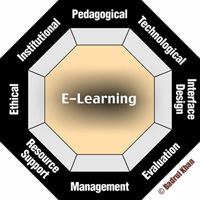
By
Badrul H. Khan


1. INSTITUTIONAL
1.1 Administrative Affairs
1.1.1 Needs Assessment
1.1.2 Readiness Assessment (Financial, Infrastructure,
Cultural and Content readiness)
1.1.3 Organization and Change (Diffusion, Adoption
and Implementation of Innovation)
1.1.4 Budgeting and Return on Investment
1.1.5 Partnerships with Other Institutions
1.1.6 Program and Course information Catalog (Academic
Calendar, Course Schedule, Tuition, Fees, & Graduation)
1.1.7 Marketing and Recruitment
1.1.8 Admissions
1.1.9 Financial Aid
1.1.10 Registration and Payment
1.1.11 Information Technology Services
1.1.13 Instructional Design and Media Services
1.1.14 Graduation Transcripts and Grades
1.2 Academic Affairs
1.2.1 Accreditation
1.2.2 Policy
1.2.3 Instructional Quality
1.2.4 Faculty and Staff Support
1.2.5 Class Size, Workload and Compensation and
Intellectual Property Rights
1.3 Student Services
1.3.1 Pre-enrollment Services
1.3.2 Orientation
1.3.3 Faculty and Staff directories
1.3.4 Advising
1.3.5 Counseling
1.3.6 Learning Skills Development
1.3.7 Services for Students with Disabilities
1.3.8 Library Support
1.3.9 Bookstore
1.3.10 Tutorial Services
1.3.11 Mediation and Conflict Resolution
1.3.12 Social Support Network
1.3.13 Students Newsletter
1.3.14 Internship and Employment Services
1.3.15 Alumni Affairs
1.3.16 Other Services
2. PEDAGOGICAL 2.1 Content Analysis 2.2 Audience Analysis 2.3 Goal Analysis 2.4 Medium Analysis 2.5 Design approach 2.6 Organization 2.7 Methods and Strategies 2.7.01 Presentation 2.7.02 Exhibits 2.7.03 Demonstration 2.7.04 Drill and Practice 2.7.05 Tutorials 2.7.06 Games 2.7.07 Story Telling 2.7.08 Simulations 2.7.09 Role-playing 2.7.10 Discussion 2.7.11 Interaction 2.7.12 Modeling 2.7.13 Facilitation 2.7.14 Collaboration 2.7.15 Debate 2.7.16 Field Trips 2.7.17 Apprenticeship 2.7.18 Case Studies 2.7.19 Generative Development 2.7.20 Motivation
3. TECHNOLOGICAL
3.1 Infrastructure Planning (Technology Plan,
Standards, Metadata, Learning Objects)
3.2 Hardware
3.3 Software (LMS, LCMS, Enterprise Application)
4. INTERFACE DESIGN 4.1 Page and Site Design 4.2 Content Design 4.3 Navigation 4.4 Accessibility 4.5 Usability Testing
5. EVALUATION
5.1 Assessment of Learners
5.2 Evaluation of Instruction & Learning
Environment
6. MANAGEMENT 6.1 Maintenance of Learning Environment 6.2 Distribution of Information 7. RESOURCE SUPPORT 7.1 Online Support 7.1.1 Instructional/Counseling Support 7.1.2 Technical Support 7.1.3 Career Counseling Services 7.1.4 Other Online Support Services 7.2 Resources 7.1.1 Online Resources 7.1.2 Offline Resources 8. ETHICAL 8.1 Social and Political Influence 8.2 Cultural Diversity 8.3 Bias 8.4 Geographical Diversity 8.5 Learner Diversity 8.6 Digital Divide 8.7 Etiquette 8.8 Legal Issues 8.8.1 Privacy 8.8.2 Plagiarism 8.8.3 CopyrightChapter 8 of my Web-Based Training book discusses the e-Learning Framework in more detail. 
Recommended Books . |